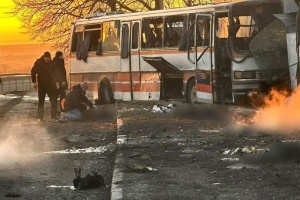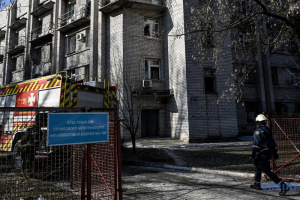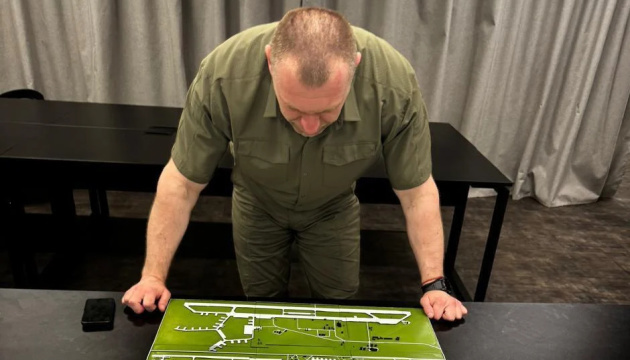
SBU’s drone operation has waved a web of humiliation and strategic losses for the Kremlin
Here we provide a review of the implications for the Kremlin arising out of the unprecedented drone operation carried out by the Ukrainian special services, as well as its long-term implications for global security.
On June 1, Ukraine’s Security Service (SBU) carried out Operation Spider Web, which is already claiming a separate chapter in military art textbooks – simultaneous successful attacks on four major Russian airbases: Belaya, Diagilevo, Olenya and Ivanovo. It was there from where bomber aircraft that brought death and destruction to Ukrainian cities took off. According to the SBU, Spiderweb resulted in the destruction of 41 Russian aircraft -- including not only the “workhorses” of terror Tu-95s and Tu-22M3s, but also the flagship Tu-160 and extremely valuable A-50 -- a blow that significantly undermined Russia’s strategic cruise missile carrier capabilities.
This is a comment from Brian Krassenstein, a renowned political analyst: “In what can only be described as a stunning act of covert military ingenuity, Ukraine has reportedly struck 41 Russian bombers across four separate air bases, some located as far as 4,400 kilometers from Ukraine's borders. According to reports, Ukraine secretly transported wooden mobile cabins into Russia, disguising FPV drones beneath their roofs. These cabins were mounted on trucks and parked in position, hidden in plain sight. When the signal was given, the roofs remotely swung open like something out of a sci-fi film. And then? Dozens of drones launched straight from the trucks, flying directly into the heart of Russia’s strategic air power, obliterating bombers that the Kremlin can’t even produce anymore due to sanctions and critical shortages. The implications are staggering. This kind of operation, conducted this deep inside enemy territory, using mobile disguised platforms, has never been done before. Not at this scale. Not with this level of impact. Russia just lost a significant chunk of its long-range bomber fleet. And unlike missiles, bombers aren’t quickly replaceable”.
Such a loss is not only a tactical setback but also represents a profound disruption to Russia’s long-range strike potential. The SBU chief, Lieutenant General Vasyl Malyuk, stated: “Overall, we are talking about the destruction of 34 percent of strategic cruise missile carriers at major airfields in the Russian Federation. It was not just a devastating blow to Russia’s strategic cruise missile carrier fleet, but a slap in the face of the military might and terrorist essence of the Russian Federation.”
The technical details of this highly sophisticated, filigree operation have already been analyzed to the bone. But we are curious to know something else: can the consequences of this “friendly visit” by drones be reckoned a turning point in the war?
IMPACT ON THE BATTLEFIELD SITUATION AND TURNING POINT IN THE WAR
Spider Web Operation undoubtedly became an event that made many talk about the war reaching a significant turning point in the dynamics of the ongoing conflict with Russia. However, the expert community calls for moderate optimism, analyzing the real, rather than the desired impact this can have on the battlefield situation.
For example, Oleksandr Kovalenko, a defense analyst at the Information Resistance Group think tank offers a sober view of the situation, distinguishing between the impact on the battlefield situation and on the enemy’s potential for terrorist attacks. He emphasizes that the affected aircraft are not the ground attack or fighter platforms that have a direct impact on the frontline situation. “I would not reckon this a turning point of the war, because we are not talking about combat aircraft that are actively used on the front line. We are talking about the aircraft that were mainly used to terrorize the civilian population – bombing cities in deep rear areas of Ukraine and delivering strikes on energy and civilian infrastructures.”
According to Mr. Kovalenko, this will have a direct impact on the intensity of missile attacks, in particular ones using long-range Kh-101, Kh-22 or Kh-32 cruise missiles. “Nowadays, even the simultaneous launch of 50 such missiles is an unlikely scenario,” Kovalenko summarizes, indicating that the net effect will be a reduction in the number of bombing attacks on civilians and infrastructure, but will hardly impact the battlefield.
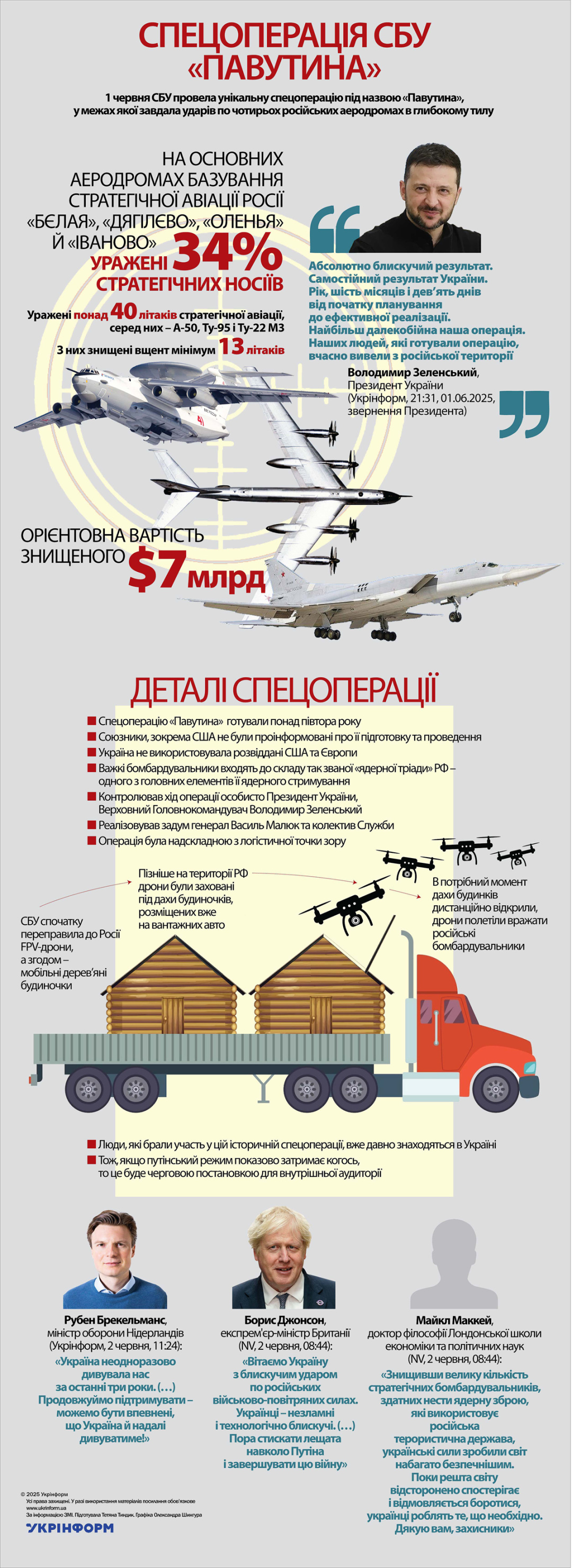
Pavlo Lakiychuk, head of security programs at the Center for Global Studies “Strategy XXI,” puts a slightly different emphasis. While acknowledging that Spiderweb will not break the backbone of the Russian warfighting machine instantly, since other types of weapons dominate the battlefield, and the Russian Federation still has Shahed one-way attack drones and ballistic missiles to strike our rear areas, he underscores the enormous military-psychological significance of this operation. “The engagement and sinking of the Russian Black Sea Fleet flagship [Moskva in April 2022] was the prologue to a turning point of the war at sea. Similarly, the destruction of part of Russia’s strategic aircraft fleet could be a hallmark of a turning point in the battlefield situation. Not today, because Medinsky, at Istanbul, will be claiming that they will definitely reach the Dnieper, if not in twenty, then in a hundred years, and nothing will be able to prevent it. But, you must admit, these words, the day after “Tsushima-2”, will be perceived in the world completely differently from how they were perceived the day before yesterday.”
Lakiychuk points out that successes on the battlefield are the foundation for diplomatic victories, and it is politicians and diplomats who should “consolidate” on the diplomatic front the successes achieved by our military on the battlefield.
That said, though it is too early to talk about the war reaching a turning point, Operation Spiderweb created a powerful psychological effect, which, if skillfully used, can be converted into real diplomatic dividends.
REVERBERATIONS THROUGHOUT THE WORLD: WHAT DID THE WEST SEE AND WHAT SHOULD IT BE GRATEFUL TO UKRAINE FOR?
The smokescreen over Russian airfields turned out to be surprisingly transparent for the international community. The “explosive incident” forced many to take a new look at Ukraine’s capabilities and, more importantly, Russia’s vulnerability.
Oleksandr Kovalenko draws attention to who exactly was watching this absolutely humiliating public show of force. And they were not only those whom the Russian propaganda machine brands as “adversaries”. “The most important thing is not even that the West was watching it – it was closely watched as well by the so-called “friends” of Russia, in particular China. Beijing has seen how the strategic air fleet of a nuclear capable power, which until recently claimed the status of a global player, was being destroyed in series of strikes with cheap FPV drones.”
The expert is of the opinion that it is the reaction of “friends” such as China that can have the most serious long-term implications for Moscow, up to and including acceleration of the process of vassalizing.
Political scientist Serhii Taran complements this picture with an analysis of how the operation will affect the general perception of Russia in the world. Talk about Russia winning its war against Ukraine will decrease, as will fears of it hypothetically launching a war against the West. “However, it is much more important that confidence in Ukraine’s capabilities will create a positive context for support – they in the West tend to help not the weak, but those who know how to win.” Taran notes with a hint of irony that the fall of Russia's image as a powerful military force "will make everyone happy, even Comrade Xi will be happy, although he will not tell anyone about it."
The political scientist also points to a fundamental shift: "The audacious raid on a nuclear-armed nation’s strategic aircraft fleet signifies a rethinking of the role of nuclear weapons in the world. This no longer provides meaningful security guarantees... The Cold War patterns have been broken... Even Elon Musk, who is known for his controversial stance on Ukraine, was forced to comment on the Ukrainian drone attack by saying that drones are the “future of warfare”, and Ukraine is at the forefront of these technologies. And this is not a metaphor, but a simple fact.
So, the West and the rest of the world once again received an object lesson: the Russian Goliath turned out to be vulnerable to the Ukrainian David armed with a technological slingshot. And a gratitude to Ukraine may lie not only in the fact that it deters and contains the aggressor, but also in the fact that it destroys dangerous myths and accelerates the technological evolution of warfare, demonstrating that the future lies in innovation, not in the rattling of rusty weapons.
REPUTATIONAL BLOW AND HISTORICAL PARALLELS: TSUSIMA-2 FOR RUSSIA’S STRATEGIC MISSILE CARRIER CAPABILITIES
Whereas military-strategic ramifications of Operation Spiderweb will still unfold as time passes, the reputational blow to Russia is instantaneous and devastating. The level of humiliation of that loss is difficult to find in modern history, and experts are already looking for adequate parallels.
Oleksandr Kovalenko categorically states that there are currently no analogues to this operation in the world. According to him, nothing can compare to the Ukrainian success in terms of extent, effectiveness, or cost-effect ratio.
“Even the famous Israeli operation Pager – yes, technically everything was done brilliantly, but you have to understand: Hezbollah is Hezbollah, Lebanon is Lebanon. And here is a completely different level,” the defense analyst argues.
He emphasizes: where an FPV drone worth several hundred dollars destroys an aircraft worth hundreds of millions, and its strategic value is priceless because it can be reproduced any longer, this makes the operation unique in the global historical context.
Pavlo Lakiychuk rejects the comparison with Pearl Harbor, which is shared by Russian Z-bloggers, and insists on another analogy, much more painful for the Russians: “This is not Pearl Harbor – this is Tsushima! ...Even assuming that Operation Spiderweb incapacitated not four dozen Russian strategic aircraft but just half as many, then in terms of the air component of the nuclear triad, Russia falls to third place, behind not only the United State, but also China.
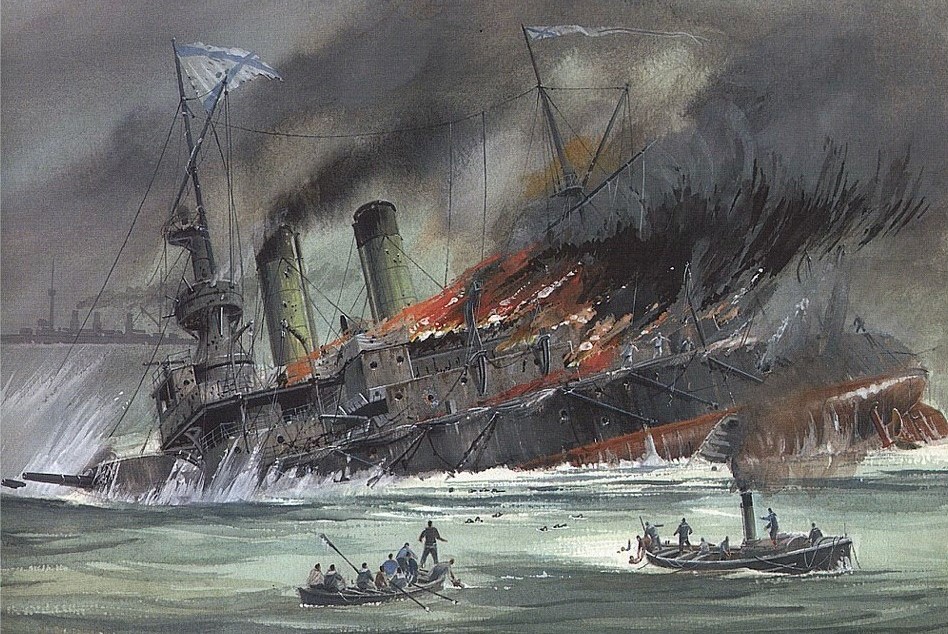
An artistic representation of one of the crucial episodes of the Battle of Tsushima (1905), where a Russian Imperial Navy’s battleship is defeated and burns in flames, while the sailors escape in lifeboats
To better understand the significance of the comparison with Tsushima, let us quote the Ukrainian writer and military officer Ostap Ukrainets: “The Battle of Tsushima took place 120 years ago, on May 27-28, 1905..., when the Japanese Admiral Togo Heihachiro defeated two-thirds of the 2nd Pacific Fleet of the Imperial Russian Navy... The defeat in this battle accelerated the revolutionary processes and the collapse of the monarchical system in the Russian Empire.”
For Russia’s strategic aircraft fleet, the image of Tsushima is not just a right metaphor. It is a hallmark of potentially tectonic shifts in the perception of Russia as a military power, a blow to the very foundation of its imperial ambitions.
THE PAIN OF LOSSES FOR THE RUSSIAN FEDERATION: IRREPLACEABLE “BIRDS” AND STRATEGIC RAMIFICATIONS
What makes the loss of these seemingly obsolete Soviet aircraft that critical for modern Russia? The answer lies in their irreplaceability and the key role they hold in the Russian Federation’s military doctrine, in particular as carriers of nuclear weapons.
Kovalenko explains in detail why these losses are irretrievable. This is about the Tu-95MS, Tu-22M3, and Tu-160 – the aircraft that have long gone out of production: “True, the Kazan Aviation Plant is formally imitating reopening of the production line for the Tu-22M3 and Tu-160 airplanes, but in actual fact, these are not newly-built aircraft. This is a modification of the fuselages that left over from Soviet times - from the late 1980s, early 1990s... 41 aircraft were destroyed or damaged - and Russia is unable to manufacture even a part of them anew.
Particularly painful, according to the expert, may be the confirmation of reports about successful hits on two of the three A-50 AWACS aircraft that were airworthy at the time of Operation Spiderweb. These are unique machines that are practically impossible for the Russian Federation to bring back to operational status under the current conditions. With only one such aircraft remaining airworthy, the Russian strategic aircraft fleet will actually be made blind.
Viktor Kevlyuk, an analyst at the Center for Defense Strategies offers a quantitative assessment of the damage caused to the air component of the enemy's nuclear triad. While previously, the air component accounted for 10-15 percent of Russia’s nuclear weapons potential, Operation Spiderweb, according to his calculations, has reduced this to just 5-7 percent. “Strategic aircraft fleet has actually lost the ability to deliver a massive first strike – its role has been halved… The loss of part of the Tu-95MS aircraft fleet is particularly painful: these are carriers of Kh-102 nuclear-armed, 5,500-kilometer range missiles, which made the backbone of Russia’s potential to deliver a massive strike on the USA or Europe,” he says.
Kevlyuk also emphasizes the stunning asymmetry of the drone strike: the attack with 250x FPV drones worth $1,000 each on four airfields cost a million U.S. dollars (plus logistics), while the enemy’s losses are two thousand times greater. “This is what asymmetry looks like in modern warfare,” the expert notes.
Valery Romanenko, an aviation expert, completes the picture, emphasizing that the Russians have lost not just aircraft, but the “illusion of security”: “There simply aren’t many airfields in Russia that can accommodate such planes… Theoretically, the surviving planes can be redeployed to Olenya, Mozdok, or Seryshevo (Ukrainka airbase), but even there they are not safe from attacks. There is no longer a safe airbase.” According to Mr. Romanenko, Operation Spiderweb has busted the myth about invulnerability, because “the war has come to Engels, to Belaya, to Vladivostok.” Ukraine has demonstrated the ability to deliver pinpoint strikes that change the geopolitical balance.”
Thus, the extent of the loss for the Russian Federation is not measured in the number of incapacitated aircraft only. It is a long-term undermining of warfighting capability, the loss of unique technologies, the collapse of the myth of deep rear security, and a demonstration of the stunning economic inefficiency in the face of modern asymmetric threats.
INTERNATIONAL REACTION: ENJOYMENT, ANALYSIS, AND CALL FOR ACTION
SBU’s Operation Spiderweb caused a real flurry of excitement around the globe, where admiration for Ukrainian ingenuity was mixed with a comprehensive analysis of the consequences and implications for global security.
Former Swedish Prime Minister Carl Bildt: “Not even the 007 movies managed to come up with something like this.”
Former U.S. Army Commander in Europe Ben Hodges endorsed Ukraine’s strategy with an apt military aphorism: “Better to kill the Archer instead of trying to stop all of the Arrows!”
Michael McKay, Ph.D. from the London School of Economics and Political Science, participant in the democratic renaissance of Ukraine, chronicler of Russia's war of aggression, made a blunt statement about Ukraine’s contribution to global security: “By destroying a significant number of strategic bombers capable of carrying nuclear weapons — used by the Russian terrorist state — Ukrainian forces made the world much safer. While the rest of the world looks on passively, Ukrainians do what must be done. Thank you, defenders.”
US Congressman Don Bacon also commented briefly: “Putin sowed the wind and is now reaping the whirlwind.”
Dutch Defense Minister Ruben Brekelmans reminded us that it is not for the first time Ukraine is surprising the world: “Ukraine has surprised us so many times over the last three years. Just a few examples: The Moskva (2022), counter offensive (2023), Kursk (2024) and now the drone attack on Russian bombers. Let’s keep up our support, we can be sure Ukraine will keep up its surprises!
Brian Krassenstein, a renowned political commentator: “Ukraine just pulled off one of the most daring strikes in modern warfare. In what can only be described as a stunning act of covert military ingenuity, Ukraine has reportedly struck 41 Russian bombers across four separate air bases, some located as far as 4,400 kilometers from Ukraine's borders. The implications are staggering. This kind of operation, conducted this deep inside enemy territory, using mobile disguised platforms, has never been done before. Not at this scale. Not with this level of impact. Russia just lost a significant chunk of its long-range bomber fleet. And unlike missiles, bombers aren’t quickly replaceable.
Former British Prime Minister Boris Johnson: “Congratulations to Ukraine on a brilliant strike against the Russian air force," -- he wrote -- "Ukrainians are unbreakable and technologically brilliant. They’re doing everything they can to hit military targets, while Putin indiscriminately slaughters civilians. Time for the UK and EU to back Lindsey Graham’s secondary sanctions bill. Time to tighten the noose around Putin and end this war.”
David Frum, Canadian-American political commentator and a former speechwriter for President George W. Bush saw in this operation a change in the dynamics of relations between Kyiv and Washington: “We've reached the point where Ukraine needs to consider very hard whether it's willing to extend a Ukrainian security guarantee to NATO. (…) Biden's aid to Ukraine bought the US a veto over Ukrainian actions. Trump-Vance sell-out of Ukraine invalidated the US veto - and the Ukrainians are proving they are highly capable of carrying out important operations that the US would want to veto if it could”.
Wall Street journalist Yaroslav Trofimov summed it up succinctly: “Russia refused Ukraine’s offer of total or air ceasefire. Trump refused Ukraine’s request for air defenses and declined to sanction Russia for murderous missile attacks on Ukrainian cities. Ukraine took out the planes used for these missile attacks. Simple”.
Irish journalist Caolan Robertson pointed to the deep symbolism of the attack: “This morning the world witnessed one of the most brilliant asymmetric strikes in modern warfare. Ukraine didn't just hit Russia's planes. They hit Russia's pride. They hit the illusion of control. The world saw that Russia is weaker than it pretends to be.
This chorus of voices testifies: the SBU’s Operation Spiderweb is not just a military success. It is a powerful message to the world about Ukraine’s resilience, technological sophistication, strategic thinking, and the ability to change the rules of the game.
CONCLUSION NOTES
The SBU’s Operation Spiderweb was not just another episode in the Russo-Ukrainian war, but a development that carries multidimensional implications. It has significantly reduced Russia's terrorist potential for strikes on Ukrainian rear regions, dealt a devastating reputational blow to the Kremlin, and demonstrated to the entire world, including the so-called "allies" of the Russian Federation, its military and technological vulnerability.
Though it would be premature to call this operation a one-time turning point in the war, it is undoubtedly an important step towards changing the strategic balance. Spiderweb once again proved the high professionalism of Ukrainian special services and Ukraine's ability to deliver asymmetric strikes that are followed by much reverberations throughout the world. The world saw that the Ukrainians are not just defending themselves, but are also actively shaping a new reality on the battlefield and in geopolitics, forcing it to rethink outdated ideas about military power and security.
Myroslav Liskovych

